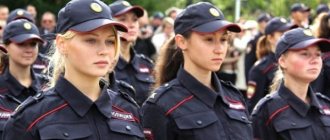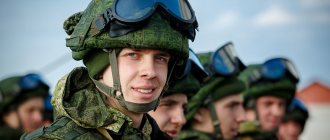Today in Russia about 750,000 people work in the police. Many people have heard that police officers have good salaries, pensions, benefits and various government support options. The position of a police officer is a budget-funded one, so the financial support of this specialist really falls entirely on the shoulders of the state. This leads to the fact that there are no delays in the payment of wages, and the very schemes by which wages are calculated have been tested by many years of practice.
Professional Responsibilities
Everyone has a chance to get a job in the Ministry of Internal Affairs, regardless of gender and education. However, to obtain a police position, several conditions are required. First of all, this is the absence of a criminal record, both for the job applicant and for his close relatives. In addition, you must provide your written consent to verify your personal data.
Police candidates will have to undergo a serious medical examination, since an absolutely healthy person must work in law enforcement agencies. Moreover, in addition to good indicators of physical health, he must have good mental health. Therefore, an applicant for the position of police officer will have to undergo psychological testing. And also provide a certificate from specialists about the absence of drug addiction and sexually transmitted infections.
Job responsibilities
In fact, the local police officer must be responsible for order in the territory entrusted to him. Thus, the duties of a district police officer include:
- implementation of administrative supervision over criminals who have served their sentences and live in the area entrusted to him,
- passport control,
- conducting preliminary investigation of offenses,
- search and delivery of “evaders”, that is, people who evade military service,
- detection of minor and medium-sized crimes,
- registration of documents in the event of the death of a citizen (regardless of the cause of death),
- conducting preventive conversations with alcoholics and drug addicts,
- control of the work of cafes, bars, entertainment venues located on the territory of this site.
Theoretically, a local police officer should also receive citizens three times a week and accept requests from them, and also conduct door-to-door visits to his precinct twice a year. However, in practice, due to the large number of cases and government orders, this is practically impossible, not to mention carrying out preventive work to prevent crimes, which is also the responsibility of the same district police officer.
Other professions: Logistics profession - who is it and what does it do, what is the salary?
What does salary depend on?
To understand how much police officers in the Russian Federation receive, you need to understand what makes up the income of law enforcement officers:
- Base rate. When they talk about increasing wages, this indicator is meant. It is indexed, and for the most part additional payments are calculated from it;
- Allowance for risks associated with performing professional duties, overtime, difficult working conditions, etc. In each region, additional payments are assigned depending on local conditions: the criminal situation, budget capabilities;
- Regional coefficient. Each region has its own indicators for rewarding law enforcement officials. As an example, we can cite the Northern and Ural coefficients;
- Long service bonus. A single coefficient is applied in all regions;
- Bonus for rank. Only the base rate remains unchanged and is set at the federal level. Everything else depends on various factors.
Only the base rate remains unchanged and is set at the federal level. Everything else depends on various factors.
The average salary of a police officer in Russia
Average salary in the Russian police.
The monthly income of a police officer consists of several parts:
- Fixed salary. Its size is set at the federal level depending on rank. The rate is indexed based on its value, and premiums are assigned.
- Hazard and overtime pay. This includes exceeding the plan for closing cases, the criminal situation at the site, additional working hours, etc.
- Regional coefficient. Installed independently in each region.
- Accrual for continuous work experience. The value is the same for all regions.
- Bonus for rank.
Influence of position
The lowest salaries are for ordinary police officers - 6 thousand rubles. The basic allowance for a patrol officer or sergeant is 7 thousand rubles, for a warrant officer - about 8.6 thousand rubles.
The rate for a junior officer is slightly higher: a senior lieutenant earns at least 11 thousand rubles. per month, captain - 12.5 thousand rubles.
The salary of senior officers: major, lieutenant colonel and colonel ranges from 13 to 27 thousand rubles.
The general receives about 30 thousand rubles. excluding surcharges.
Payroll based on length of service
This form of incentive is simple: the longer a security officer serves, the greater the salary. In 2021, the increase increased by 4%.
The accrual system is as follows:
- for work in authorities from 2 to 5 years, the salary increases by 10%;
- up to 10 years - by 15%;
- up to 15 years - by 20%;
- up to 20 years - by 30%;
- more than 25 years - by 40%.
In numbers, this means that with a minimum length of service, a police officer’s income will increase to 30 thousand rubles, and closer to 20 years of work - to 45 thousand.
Types of allowances
Supplements to the salary of a police officer.
There are also charges:
- For the qualifying title:
- a 3rd class specialist receives a 5% increase in salary;
- 2nd class specialist - 10%;
- 1st class specialist - 20%;
- master - 30%.
- For special working conditions in groups of police officers, traffic police, guards of accused persons and commandant units - up to 100% of the monthly income.
- For work with classified information protected by the state - from 10 to 25%.
- For special achievements in service - up to 100%.
- For completing tasks that threaten life and health in peacetime - up to 100%.
- For work in the encryption department - from 5 to 30%.
- For work as a lawyer or legal expert - up to 50%.
Additional subsidies
Separately encouraged by the state:
- candidates - 15% and doctors of science - 30%;
- having the honorary titles “Honored” - 10% and “People’s” - 20%;
- kms and masters of sports of Russia - from 5 to 10%;
- awarded with medals and orders - from 5 to 25%;
- filling the position of medical staff with a qualification category - from 10 to 20%;
- filling the position of chief or deputy chief of police - from 30 to 50%.
Average salary of a police officer
As for earnings in Russian regions, the average salary of police officers in Russia is 40,000 rubles. It is highest in Kamchatka, about 73,500 rubles. Further across the country, police salaries are distributed as follows:
- Arkhangelsk 60,000 rubles
- Moscow and Moscow region 55,000 rubles
- Irkutsk 51,300 rubles
- Krasnodar 45,000 rubles
- Ivanovo 45,000 rubles
- Vladimir 45,000 rubles
- Penza 43,000 rubles
- St. Petersburg 40,000 rubles
- Nenets Autonomous Okrug 38,830 rubles
As this table shows, the highest salary levels for police officers, as always, are in the capital, in the north and in the eastern regions of the country. The central part of Russia traditionally lags behind in this indicator.
Salary depends on position
For example, if we talk about the salary of a local police officer in Moscow, then it is enough to analyze the labor market and current vacancies. On average, an employee in this position currently receives about 45,000 rubles (including allowances). This is not the highest rate. You can find a better offer. The salary of a Moscow police lieutenant is approximately at the same level. But it all depends on the specific position. Of course, a junior lieutenant will receive a lower salary, and a senior lieutenant will receive more.
If an officer works from 5 to 10 years, then his average salary will be 36,000 rubles. If he has worked for more than 15 years, he can count on 42,000 rubles. This is the maximum possible value for this position.
The cadet whose salary is 6,000 rubles will receive the least. But the deputy minister has a salary of 45,000 rubles, regardless of his length of service. If we talk about the salary of a police sergeant in Moscow, then in this case everything also depends on the length of service and other parameters. We also must not forget about additional benefits and other government programs.
Allowances
Until recently, the minimum wage for a police officer in Moscow was about 40 thousand rubles.
In Moscow, police officers have increased the minimum amount of bonuses for special risks, stress and difficult service conditions.
Workers who serve in high-risk conditions receive an additional payment of up to 60%. This applies to active detectives from the criminal investigation department, from the departments of personal and economic security, private security officers, soldiers and riot police. Dog handlers receive only a 20 percent salary subsidy.
Salary depending on population
The salary of a police officer also depends on how many citizens live in a particular region. For example, police salaries in Moscow will be significantly higher, since it is the largest city in the country. It belongs to the category of regions with a population of over 2.5 million people.
For example, investigators, authorized experts and other specialists can expect a salary increase of 17,000 rubles. For workers in regions with a smaller population, the amount of the supplement will be lower. In Moscow, 18,200 rubles, which are added to the salary, are expected for senior investigators and other experts with a higher rank. Department heads receive an additional salary of 20,200 rubles. Their deputies can count on the same increase. The largest allowance of 29,000 rubles is provided for heads and deputy heads of territorial bodies of the Ministry of Internal Affairs.
Additional benefits for police officers
Employees also have every right to certain benefits and guarantees of social protection. The full list of benefits available to police officers is specified in the Law “On the Police”:
- the life and health of a police officer are insured annually at the expense of the state;
- relatives who are dependent on a police officer receive insurance payments in the event of death or severe injury of the latter during the period of duty;
- police officers have the right to free medical care in medical organizations of the Ministry of Internal Affairs, to free medications with a doctor’s prescription, as well as free dentures and the manufacture of dentures themselves (but not from precious metals);
- police officers and members of their families have the right to sanatorium and resort services in departmental sanatoriums at a discount; police officers who become disabled in the service are treated in sanatoriums free of charge, including those who are retired;
- if certain conditions are met, police officers receive official housing or a subsidy for the purchase of housing property;
- When on duty, police officers have the right to use all types of public transport (except taxis) free of charge upon presentation of their identification; at other times they can use free travel passes;
- police officers working in the Far East, the Urals, the Far North and Siberia have the right once a year, together with one relative, to travel to a vacation spot in the Russian Federation and back at state expense;
- Police officers also have certain tax benefits (property).
Additional bonuses and benefits
Regardless of how much police officers earn in Russia, law enforcement officers receive additional benefits.
Main methods of incentives:
- free travel on public transport with a certificate if the employee fulfills official obligations;
- compensation for vacation travel once a year;
- free treatment and prevention of diseases in health institutions that are part of the Ministry of Internal Affairs;
- reduced retirement age;
- the possibility of placing a child in kindergarten and other educational institutions out of turn;
- extraordinary booking of accommodation and transport tickets when fulfilling official obligations.
The government is constantly increasing the amount of bonuses and benefits to increase the attractiveness of service in the Ministry of Internal Affairs.
How much do police officers earn on average abroad?
Surely you have a question: “How much do police officers earn on average abroad?” It depends on the specific country and the standard of living and social security in it. Let's try to understand this issue in more detail.
In America, the profession of a police officer is considered one of the most prestigious and fairly highly paid. The average salary of a police officer in the USA ranges from 2,349,200 to 4,111,100 rubles per year in terms of our money. Using simple mathematical calculations, it turns out from 195,66 to 342,591 rubles per month, which is at least 3–4 times more than in Russia. In addition, the police here have a lot of powers, they are right in any case and at the slightest resistance they can open fire. There are a lot of cops on the streets of American cities, but if you behave appropriately and don't break anything, they won't bother you.
But if you encounter police officers, do not make sudden movements and strictly follow all their instructions. For example, if your car is stopped, do not under any circumstances try to get out of it, but simply put your hands on the steering wheel and listen to the instructions of the patrol officers.
Where to study
You can become an ordinary police officer after serving in the RF Armed Forces. To do this, you need to find out at the nearest police station whether there are vacancies. But you cannot firmly count on the fact that a vacant position will go to a person without special knowledge, only with army experience behind him: it is too expensive - literally and figuratively - to train newcomers in such a complex matter. Therefore, preference is given to applicants with a legal education.
You can get it in many universities, but first of all you should pay attention to educational institutions of the Ministry of Internal Affairs:
- Academy of Management of the Ministry of Internal Affairs;
- Moscow University of the Ministry of Internal Affairs of Russia named after. V.Ya. Kikotya and its regional branches;
- Krasnodar University of the Ministry of Internal Affairs and its branches in Stavropol, Nalchik and Crimea;
- St. Petersburg University of the Ministry of Internal Affairs and its branch in Kaliningrad;
- Volgograd Academy of the Ministry of Internal Affairs, etc.
To enter the legal specialty, you need Unified State Examination results in the Russian language, history and social studies. Additionally, physical fitness standards are passed.
Civil universities offer a high level of education:
- Moscow University of Finance and Law;
- Russian State University of Justice;
- South Ural State University;
- Far Eastern Federal University.
If there is no final decision to connect your destiny with serving in the police, then it is enough to graduate from college in the direction of “Law Enforcement.” The leading ones are the St. Petersburg Police College and the Moscow Police College. In total, there are about twenty vocational training institutions in the country that offer legal specialties.
What is needed to serve in the teaching staff?
Many people think that anyone whose health allows it can serve in the police. Actually this is not true. There is a federal police law that clearly states the requirements for those who want to serve. Only a citizen over 18 years of age can become a police officer, provided that he has served in the army and is declared fit for health reasons. The exception is graduates of law faculties who graduated from state universities - for them, military service is not a prerequisite.
Other professions: What is the salary for working as a janitor?
Before entering the service, a future teaching staff member undergoes a medical examination. This takes quite a long time - about two months. During this time, not only the presence of serious illnesses or consequences of injuries is checked, but also the mental state.
If the candidate meets all the requirements and manages to pass the medical examination, he becomes an active police officer and is sent to one of the relevant departments of the internal affairs department, where he begins to work.
When applying for a job, having a driver's license of category B, that is, to drive a passenger car, is considered an important advantage. In the future, such an employee can receive 5-10% more.
Many people don't know where to start looking for a police job. In fact, vacancies are often posted on the same portals where any other job is posted. The most up-to-date information can be obtained from the HR department at the central police station in your city.
Pros and cons of the profession
Description of benefits:
- annual salary increases and career opportunities up to the rank of general;
- special social status, free medical care, travel vouchers, for girls - special conditions during pregnancy, etc.;
- early retirement for both women and men, according to the seniority regulations.
Description of disadvantages:
- Irregular schedule, that is, work on night and daily shifts, constant travel and business trips.
- Difficulties in personal life, especially for women. Young girls face great difficulties with career growth, since they spend a lot of time on maternity leave and raising children. If there is a lot of competition for jobs, preference will be given to a man over a woman.
- A daily threat to the life and health of a police officer and his family.
- The negative attitude of many citizens towards the police as a profession.











